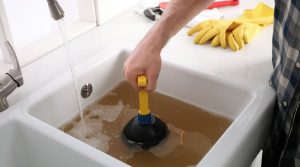Water heaters include metal, water, and oxygen, which is the perfect recipe for starting the chemical reaction that causes corrosion despite the fact that they are meant to prevent corrosion from happening. The issue will become significantly worse if the water contains any poisons or minerals.
It’s probably time to replace your water heater if you find that there are signs of corrosion starting to appear. Learn how to spot the telltale signs of water heater corrosion and what to do if you have cause to think it’s happening within your water heater.
Is your water heater leaking or failing to provide you with hot water? Use (973) 601-5593 to contact CBJ Passaic Plumbers for qualified assistance.
What to Consider When Examining Corrosion in a Water Heater
To determine whether your water heater is experiencing corrosion, look for any one of these three critical warning signs:
- Water that is rusty in color: If the hot water coming from your hot water heater is rusty in color, your unit may be corroded. Water heaters of any age, even those that are only eight years old, can rust.
- Rusted valves: If the water inlet valve or the pressure release valve on your water heater are rusted, there probably is rust inside the tank as well. Flushing the tank with vinegar and water will get rid of the rust. It’s past due for you to replace the water heater in your house!
- Leaks in a water tank: Contact a plumber immediately to arrange for a skilled expert to conduct an inspection if the water tank itself appears to be dripping water. It may be challenging to determine whether the leak is coming from the seams of the tank or the drain valve, so hold out until you obtain a professional diagnosis. But until you have a diagnosis, you shouldn’t give up.
In addition to the water heater’s age, other potential causes of water heater corrosion include the accumulation of minerals and sediments in the water heater.
Water heater connections have corrosion
If the hot water tank and the pipes that link to it appear to have rusted or corroded seams, a catastrophic breakdown of the water heater may be just around the corner. Your water heater should be replaced with a new one if there is any rust on the tank or any other portion of the appliance. The corrosion will eventually cause leaks or flooding if it is not halted.
On the other hand, galvanic corrosion might be present if you notice corrosion at the intersection of your water heater’s steel and copper pipes (electrochemical). Your home’s water pipes may need to be replaced, but once that work is done, your water heater ought to be good and able to function regularly. Getting assistance from a plumber who is qualified to handle the work should be your first step in resolving the problem.
How to Stop Your Water Heater From Corroding
A basic maintenance routine for your water heater might help you perhaps stop corrosion from shortening its lifespan.
- Galvanized pipe joints ought to be swapped out with plastic-lined nipples, also known as dielectric nipples, to reduce galvanic corrosion between connections made of steel and copper.
- The anode rod needs to be examined annually, and it needs to be replaced as necessary.
- Drain the hot water tank to remove the sediment once a year.
CBJ Passaic Plumbers is the business to contact if your water heater needs to be replaced
Do you see any corrosion signs in the? not a problem Any and all problems involving water heaters can be handled by the water heater experts in your neighborhood CBJ Passaic Plumbers. We will contact you as soon as we can when you call us at (973) 601-5593 or complete our estimate request form.





